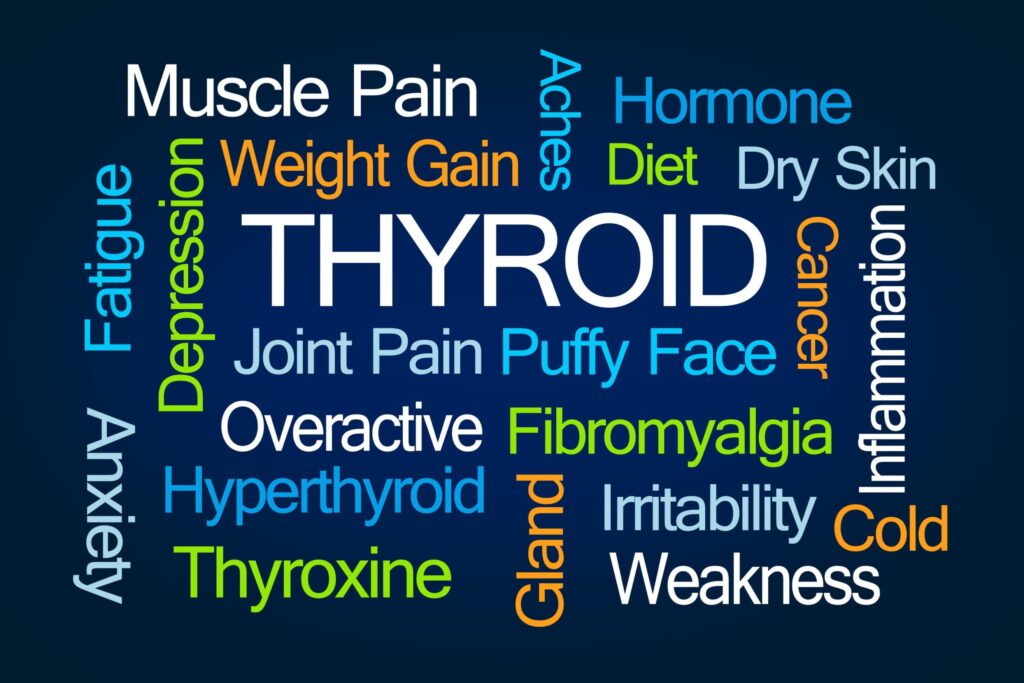January is National Thyroid Awareness Month, which makes it the perfect time to increase our knowledge on this very important butterfly-shaped gland. This small gland is found just below the Adam’s apple in the base of the neck. Even though this is a relatively small gland, it has an enormous amount of responsibilities within our bodies. It directly impacts the function of many of our vital organs including the heart, brain, liver, kidneys, and skin. Making sure your thyroid gland is working properly is extremely important to your body’s overall health and well-being.
The main function of the thyroid gland is to secrete hormones. The main hormones released by the thyroid are triiodothyronine (T3), and thyroxine (T4). These hormones deliver energy to cells in the body. The thyroid gland gets its main direction from the pituitary gland, which sends messages to the thyroid gland, telling it how much thyroid hormone to make. Outside influences such as certain medications, disease, or damage to the thyroid can breakdown the communication between the pituitary and thyroid gland. When this happens, your thyroid gets confused and can either make too much or not enough hormones.
This leads to the 2 most common thyroid disorders:
1. Hypothyroidism: Hypothyroidism is one of the most misdiagnosed, misunderstood, and prevalent medical conditions in the United States. Studies indicate that as many as 3 million Americans suffer from this condition. The symptoms associated with this condition are often blamed on aging and the common stressors of everyday life. Women are five times more likely to suffer from this condition than men.
Hypothyroidism occurs when your thyroid does not make a sufficient amount of hormone. The most common reason for hypothyroidism is known as Hashimoto’s. Hashimoto’s is condition where your immune system attacks your thyroid gland and eventually it ‘poops’ out. It is a progressive disease, which can affect other hormone-producing glands, if not treated. Hypothyroidism ‘slows down’ your body’s metabolism and makes your immune system less effective.
Symptoms of hypothyroidism may include:
• Slowed metabolism
• Fatigue
• Weight gain
• Depression
• Joint/muscle pain
• Sensitivity to cold
• Dry and brittle hair, nails, and skin
• Brain fog
• Constipation
• Menstrual cycle changes
2. Hyperthyroidism: With hyperthyroidism, the thyroid gland is producing too much hormone sending your body systems into overdrive. Although not as common as hypothyroidism, there are still over 200,000 U.S. cases per year. It is also more prevalent among women than it is with men.
Some common symptoms include:
• Racing heart
• Irritability
• Trouble sleeping
• Unexplained weight loss
• Nervousness
• Anxiety
• Sensitivity to heat
• Swelling at the base of the neck
If thyroid conditions are left untreated, they can lead to elevated cholesterol, heart issues, osteoporosis, and infertility. Research is also showing a strong link between thyroid disease and other autoimmune diseases such as diabetes, anemia, and arthritis. Symptoms of thyroid disease can vary from one person to the next, and not every symptom means you have a thyroid disorder. If you have been experiencing and are concerned about any of these mentioned symptoms, please consult your physician. They can order and perform appropriated testing to check your thyroid.
We at Blue Sky MD are here to provide you with a complete evaluation of thyroid function. We will provide a physical examination, take a complete history of symptoms, conduct lab testing, and provide safe and effective treatment. Contact any of our Blue Sky MD offices today to schedule a visit.



